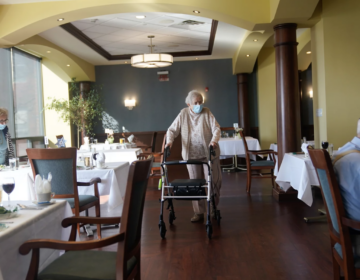Pa. Health Department ordered to turn over leases on nursing homes
A PennLive investigation found problems at homes formerly owned by Golden Living.

The Golden Living center West Shore as seen on May 19, 2016. PennLive's public records request for leases of nursing homes formerly managed by Golden Living was granted by the state's Office of Open Records. (Sean Simmers/PennLive.com)
The state Department of Health has been directed to turn over nursing home lease agreements, following a petition from PennLive.
PennLive reporter Daniel Simmons-Ritchie initially sought the leases as part of a special investigation examining the quality of care in nursing homes. (Read the full report: Still Failing The Frail.) The state Office of Open Records ruled this week that the health department must provide the leases within 30 days.
Several months ago, PennLive asked the health department for the leases of 36 nursing homes that had previously been owned by the Golden Living chain, a giant in the industry. Golden Living sold its nursing home licenses to other operators but the company still owns the properties. Nursing home operators typically submit the leases to the health department, which regulates the industry.
The health department rejected PennLive’s request for the documents, saying the records contained confidential information. PennLive appealed to the office of open records.
In its special report published last month, PennLive’s investigation found that many homes formerly owned by Golden Living continue to offer substandard care, even under new management. PennLive has been aiming to obtain the lease agreements because they could provide more insight into the operations of the homes.
“This is important information for the public,” said Burke Noel, PennLive’s Director of Content. “It certainly falls under the state’s open-record laws.”
Nursing home operators objected to the release of the leases and other records sought by PennLive. The homes said that some of the documents contained trade secrets and disclosing the records could hurt their businesses in a highly competitive field. Responding to petitions from the nursing homes, the open records office ruled that some information regarding their business practices would not be released.
But the open records office said the leases can be released under the state’s Right-To-Know Law.
The health department and the nursing homes can appeal the ruling to Commonwealth Court. In a statement, the health department said the nursing home operators, which own the documents, have 30 days to decide whether to appeal the ruling.
Melissa Melewsky, an attorney for the Pennsylvania NewsMedia Association, welcomed the Office of Open Records’ ruling ordering the release of the nursing home leases. Melewsky said the office “recognized that public agencies can’t allow private businesses seeking licensure to simply declare things confidential with a rubber stamp.”
“It’s critically important that there’s access and accountability when Pennsylvania’s most vulnerable population is at issue,” she said.
In its special report published last month, PennLive examined care at the homes formerly run by Golden Living. The state Attorney General’s office sued Golden Living in 2015 for chronic understaffing and failing to provide basic care.
The PennLive investigation found that many of the homes continue to have problems.
State regulators have cited the homes for a host of issues, including supervisory failures that harmed residents, unsanitary conditions, insect infestations and falsified records. Many of the homes have received as many citations – or more – than they did when they were managed by Golden Living.
Critics have said the health department must do a better job overseeing nursing homes. Some advocates contend the state should impose stiffer penalties for homes that fail to improve.
In its investigation, PennLive reviewed property records that show Golden Living still acts as a landlord for the homes it formerly managed in Pennsylvania.
Golden Living sold its nursing home licenses in Pennsylvania to four other companies. But Golden Living still owns the real estate for all the homes it once managed in the Keystone State.
Matt Yarnell, president of the SEIU Healthcare of Pennsylvania, told Pennlive that nursing home leasing deals make it difficult for the public to understand what companies own which homes. And Yarnell said that makes it hard to know what influence those companies may be exerting behind-the-scenes. The union represents 45,000 health care workers in Pennsylvania.
“I think Pennsylvanians want to know where their tax dollars are going,” Yarnell said. “We need to know the financial arrangements behind these homes.”
David Marks, a Texas-based attorney who specializes in elderly care litigation, said some nursing home companies include very strict requirements in their leases.
Marks cited a case he’s litigating that involves a major assisted living chain. That chain, like Golden Living, leases nursing homes to other operators. Marks said the chain exercises a great deal of control over the operators through its leases.
“The lease agreements are pretty shocking,” Marks said. “The leaser effectively controls operations, approves the budget, receives financial forecasts and – if the financial forecast is not agreeable – has the right to modify the budget.”
The health department has said it is working hard to protect the 90,000 Pennsylvania residents living in nursing homes.
The department is in the process of revising its regulations regarding nursing homes and has said it plans to update the state’s minimum staffing requirements. The department is in the final stages of developing a draft of its regulations, April Hutcheson, a department spokeswoman, said via email this week.
When a draft of the regulations is complete, it will be reviewed by government regulators and various stakeholders, she said.
“We are working to make sure these draft regulations are worked through so that, to the best we can, the regulations enact real change in our oversight of nursing homes, and also in ensuring that nursing home operators realize they are a vital part of this process as we move into the future,” Hutcheson said.
WHYY is your source for fact-based, in-depth journalism and information. As a nonprofit organization, we rely on financial support from readers like you. Please give today.




